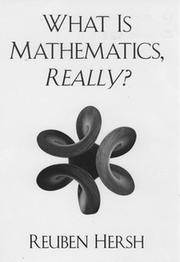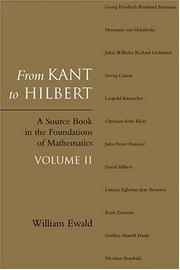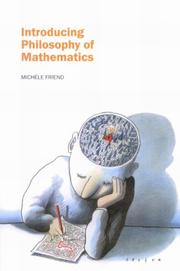| Listing 1 - 10 of 391 | << page >> |
Sort by
|
Book
ISBN: 0195035410 0195031490 0199833362 9786610522989 1280522984 0198020406 9780195035414 9780195031492 Year: 1984 Publisher: New York (N.Y.) : Oxford university press,
Abstract | Keywords | Export | Availability | Bookmark
 Loading...
Loading...Choose an application
- Reference Manager
- EndNote
- RefWorks (Direct export to RefWorks)
Mathematics --- Logic of mathematics --- Mathematics, Logic of --- Philosophy --- Mathematics - Philosophy
Book
ISBN: 3484701137 3111534626 9783484701137 Year: 1973 Publisher: Tübingen: Niemeyer,
Abstract | Keywords | Export | Availability | Bookmark
 Loading...
Loading...Choose an application
- Reference Manager
- EndNote
- RefWorks (Direct export to RefWorks)
Mathematics --- Philosophy. --- Logic of mathematics --- Mathematics, Logic of
Book
ISBN: 1139878557 1108077129 Year: 2014 Publisher: Cambridge : Cambridge University Press,
Abstract | Keywords | Export | Availability | Bookmark
 Loading...
Loading...Choose an application
- Reference Manager
- EndNote
- RefWorks (Direct export to RefWorks)
A student of Trinity College and a member of the Cambridge Apostles, William Kingdon Clifford (1845-79) graduated as second wrangler in the mathematical tripos, became a professor of applied mathematics at University College London in 1871, and was elected a fellow of the Royal Society in 1874. The present work was begun by Clifford during a remarkably productive period of ill health, yet it remained unfinished at his death. The statistician and philosopher of science Karl Pearson (1857-1936) was invited to edit and complete the work, finally publishing it in 1885. It tackles five of the most fundamental areas of mathematics - number, space, quantity, position and motion - explaining each one in the most basic terms, as well as deriving several original results. Also demonstrating the rationale behind these five concepts, the book particularly pleased a later Cambridge mathematician, Bertrand Russell, who read it as a teenager.
Mathematics --- Logic of mathematics --- Mathematics, Logic of --- Philosophy.
Book
ISBN: 1420968122 Year: 2020 Publisher: [Place of publication not identified] : Digireads. com Publishing,
Abstract | Keywords | Export | Availability | Bookmark
 Loading...
Loading...Choose an application
- Reference Manager
- EndNote
- RefWorks (Direct export to RefWorks)
Mathematics --- Philosophy. --- Logic of mathematics --- Mathematics, Logic of

ISBN: 0195113683 0585356661 9780585356662 9780195113686 0195130871 9780195130874 1280453923 9786610453924 0198027362 1602561923 0199839395 9780199839391 9781280453922 9780198027362 9781602561922 Year: 1997 Publisher: New York ; Oxford : Oxford University Press,
Abstract | Keywords | Export | Availability | Bookmark
 Loading...
Loading...Choose an application
- Reference Manager
- EndNote
- RefWorks (Direct export to RefWorks)
Tries to refine the philosophy of mathematics to reflect what mathematicians really do, and argues that mathematics must be understood in a social context.
Mathematics --- Logic of mathematics --- Mathematics, Logic of --- Philosophy.

ISBN: 1282365657 9786612365652 0191523100 1435609662 9780191523106 1383021090 9781282365650 661236565X 9781435609662 0198505361 9780198505365 Year: 2005 Publisher: Oxford : New York : Clarendon Press ; Oxford University Press,
Abstract | Keywords | Export | Availability | Bookmark
 Loading...
Loading...Choose an application
- Reference Manager
- EndNote
- RefWorks (Direct export to RefWorks)
This two-volume work brings together a comprehensive selection of mathematical works from the period 1707-1930. During this time the foundations of modern mathematics were laid, and From Kant to Hilbert provides an overview of the foundational work in each of the main branches of mathmeatics with narratives showing how they were linked. Now available as a separate volume. - ;Immanuel Kant's Critique of Pure Reason is widely taken to be the starting point of the modern period of mathematics while David Hilbert was the last great mainstream mathematician to pursue important nineteenth cnetury id
Mathematics --- Mathematicians. --- Scientists --- Logic of mathematics --- Mathematics, Logic of --- Philosophy.
Book
ISBN: 1282641727 9786612641725 1400833329 9781400833320 9781282641723 0691135452 9780691135458 Year: 2009 Publisher: Princeton, N.J. : Princeton University Press,
Abstract | Keywords | Export | Availability | Bookmark
 Loading...
Loading...Choose an application
- Reference Manager
- EndNote
- RefWorks (Direct export to RefWorks)
Hermann Weyl (1885-1955) was one of the twentieth century's most important mathematicians, as well as a seminal figure in the development of quantum physics and general relativity. He was also an eloquent writer with a lifelong interest in the philosophical implications of the startling new scientific developments with which he was so involved. Mind and Nature is a collection of Weyl's most important general writings on philosophy, mathematics, and physics, including pieces that have never before been published in any language or translated into English, or that have long been out of print. Complete with Peter Pesic's introduction, notes, and bibliography, these writings reveal an unjustly neglected dimension of a complex and fascinating thinker. In addition, the book includes more than twenty photographs of Weyl and his family and colleagues, many of which are previously unpublished. Included here are Weyl's exposition of his important synthesis of electromagnetism and gravitation, which Einstein at first hailed as "a first-class stroke of genius"; two little-known letters by Weyl and Einstein from 1922 that give their contrasting views on the philosophical implications of modern physics; and an essay on time that contains Weyl's argument that the past is never completed and the present is not a point. Also included are two book-length series of lectures, The Open World (1932) and Mind and Nature (1934), each a masterly exposition of Weyl's views on a range of topics from modern physics and mathematics. Finally, four retrospective essays from Weyl's last decade give his final thoughts on the interrelations among mathematics, philosophy, and physics, intertwined with reflections on the course of his rich life.
Physics --- Mathematics --- Logic of mathematics --- Mathematics, Logic of --- Philosophy.
Book
ISBN: 1282818422 9786612818424 0253004691 9780253004697 9780253355638 025335563X 9780253222657 0253222656 Year: 2010 Publisher: Bloomington, Ind. : Indiana University Press,
Abstract | Keywords | Export | Availability | Bookmark
 Loading...
Loading...Choose an application
- Reference Manager
- EndNote
- RefWorks (Direct export to RefWorks)
The philosophy of mathematics plays a vital role in the mature philosophy of Charles S. Peirce. Peirce received rigorous mathematical training from his father and his philosophy carries on in decidedly mathematical and symbolic veins. For Peirce, math was a philosophical tool and many of his most productive ideas rest firmly on the foundation of mathematical principles. This volume collects Peirce's most important writings on the subject, many appearing in print for the first time. Peirce's determination to understand matter, the cosmos, and "the grand design" of the universe remain relevant for contemporary students of science, technology, and symbolic logic.
Mathematics --- Logic of mathematics --- Mathematics, Logic of --- Philosophy.

ISBN: 1317493788 1317493796 1315712059 1282943278 9786612943270 1844653765 9781317493785 9781317493792 9781317493778 131749377X 9781315712055 9781844650606 9781844650613 Year: 2007 Publisher: Durham : Acumen Publishing,
Abstract | Keywords | Export | Availability | Bookmark
 Loading...
Loading...Choose an application
- Reference Manager
- EndNote
- RefWorks (Direct export to RefWorks)
In this introduction to the philosophy of mathematics, Michéle Friend examines these and other ontological and epistemological problems raised by the content and practice of mathematics. Aimed at a readership with limited proficiency in mathematics but with some experience of formal logic it seeks to strike a balance between conceptual accessibility and correct representation of the issues. Friend examines the standard theories of mathematics Platonism, realism, logicism, formalism, constructivism and structuralism as well as some less standard theories such as psychologism, fictionalism and Meinongian philosophy of mathematics. In each case Friend explains what characterises the position and where the divisions between them lie, including some of the arguments in favour and against each. The book also explores particular questions that occupy present-day philosophers and mathematicians such as the problem of infinity, mathematical intuition and the relationship, if any, between the philosophy of mathematics and the practice of mathematics. Taking in the canonical ideas of Aristotle, Kant, Frege and Whitehead and Russell as well as the challenging and innovative work of recent philosophers like Benacerraf, Hellman, Maddy and Shapiro, Friend provides a balanced and accessible introduction suitable for upper-level undergraduate courses and the non-specialist.
Mathematics --- Logic of mathematics --- Mathematics, Logic of --- Philosophy.
Book
ISBN: 3110470772 3110468336 9783110468335 9783110468304 3110468301 9783110470772 Year: 2018 Publisher: Berlin ; Boston : De Gruyter,
Abstract | Keywords | Export | Availability | Bookmark
 Loading...
Loading...Choose an application
- Reference Manager
- EndNote
- RefWorks (Direct export to RefWorks)
The present book is an introduction to the philosophy of mathematics. It asks philosophical questions concerning fundamental concepts, constructions and methods - this is done from the standpoint of mathematical research and teaching. It looks for answers both in mathematics and in the philosophy of mathematics from their beginnings till today. The reference point of the considerations is the introducing of the reals in the 19th century that marked an epochal turn in the foundations of mathematics. In the book problems connected with the concept of a number, with the infinity, the continuum and the infinitely small, with the applicability of mathematics as well as with sets, logic, provability and truth and with the axiomatic approach to mathematics are considered. In Chapter 6 the meaning of infinitesimals to mathematics and to the elements of analysis is presented. The authors of the present book are mathematicians. Their aim is to introduce mathematicians and teachers of mathematics as well as students into the philosophy of mathematics. The book is suitable also for professional philosophers as well as for students of philosophy, just because it approaches philosophy from the side of mathematics. The knowledge of mathematics needed to understand the text is elementary. Reports on historical conceptions. Thinking about today's mathematical doing and thinking. Recent developments. Based on the third, revised German edition. For mathematicians - students, teachers, researchers and lecturers - and readersinterested in mathematics and philosophy. Contents On the way to the reals On the history of the philosophy of mathematics On fundamental questions of the philosophy of mathematics Sets and set theories Axiomatic approach and logic Thinking and calculating infinitesimally - First nonstandard steps Retrospection
Mathematics --- Logic of mathematics --- Mathematics, Logic of --- Philosophy.
| Listing 1 - 10 of 391 | << page >> |
Sort by
|

 Search
Search Feedback
Feedback About UniCat
About UniCat  Help
Help News
News